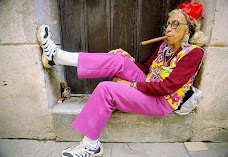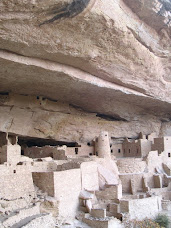Destinations are never what we expect them to be. That is perhaps the greatest joy of travel.
We pack our miniscule lives into suitcases, pretend to be unburdened gypsies for a weekend...a fortnight...a month. But really, we are cramming our whole selves in there. Our obese lives. Our obscene egos. Our gargantuan hopes and dreams and delusions. Fears and passions and loves.
Whoever said, "You can't take It with you," lied. (It was probably a beauracrat or a businessman.) You can't NOT take It with you. Amazing that It ever all fits.
How do we decide what to carry? What to leave behind? The Department of Homeland Ontology has suggestions, but they are not very practical.
If you expect to encounter the unknown, and plan accordingly, does that remove the element of surprise from the Unexpected. Does it keep the breath from being knocked out of you? And if so, does preservation of breath curb the awe? If you wish to curb your awe, why even step beyond the curb?
And what of the journey? If destinations are pleasantly unpredictable, journeys are the inexplicable phenomena of chaos theory. Why do we always plan for the destination and treat the journey itself as a heroin-chic Harlot? Is it because the Harlot is too feral, too turbulent, too rapacious to prepare for? Or is it, rather, that we judge her unworthy of our wrapt attention? An obstacle to be side-stepped. A burden from which to be freed. A gnat darting in and out of our aural periphery.
The things we lose may be more important than the things we bring back with us. It is sinful to return more beset than upon departure...unless you unburden by laying your quixotic density on others. But then, aren't you saddling them with more things...things that further terrestrialize their existences?
Although it is good to go and and even better to return, there is a part of us that would prefer never leaving the cold comfort of our heroine, the Harlot. After all, it is what we don't know that makes travel so consumingly fascinating. The surprises along the way. And she is always revealing more to us. An ankle here, an earlobe there. The curve of her collarbone. The way afternoon shadows from the tree outside the window play with the color and texture of her skin.
And every once in awhile, if we watch closely, we see something ethereal yet substanial. Mind-boggling. Inspiring to the brink of madness. Don't take your eyes off of her - especially when she holds the mirror to herself. Be myopic when the time and place are right. She holds a treasure worth keeping at such moments.
You just might return home with the memory of having seen yourself through her untainted eyes.
Thursday, August 9, 2007
Subscribe to:
Post Comments (Atom)




4 comments:
Don't you think it's possible to let parts of ourselves go, or parts of ourselves free when traveling that might not fit the scheduled confines of life at home.... or is the point to learn how to find this freedom wherever we are.... just a thought. I really did enjoy this one!!! Touched me. There you go :)
MA:
To answer your question: Yes, I DO think it's possible to lose or to leave our (little) selves behind. It was just a piece of snap (non) fiction - not necessarily a literal representation of my personal perspective.
Like much of what spills from my brain pan and seeps through the fingers, I didn't (consciously) know where it was going. It seemed to have something to do with travel as an excavationary tool for self-discovery, maybe.
...and/or losing the self to learn a little about Self?
...or freedom...
...or...
CM
I'm packin' a full bag 'cause I'm prepared and I want lunch to taste good, so I've got a cooler.
Ontology reflects ontogeny, which recapitulates phylogeny. It looks like we are here and we got here by being here.
But that was before and all we have is NOW, so nevermind...
Ya' think?
What Tad said...why didn't I just say that?
Because I am WAY too verbose...
(and I kinda dig the way words work and flow and play with one another and form ideas that are sometimes bigger than their parts and create meaning in the reader's consciousness that are formed from indivdual memory and the unique associations and experiences that we all carry with words and what they represent)
That's what I think. At least, I did when I wrote them. Then.
But now...
CM
Post a Comment